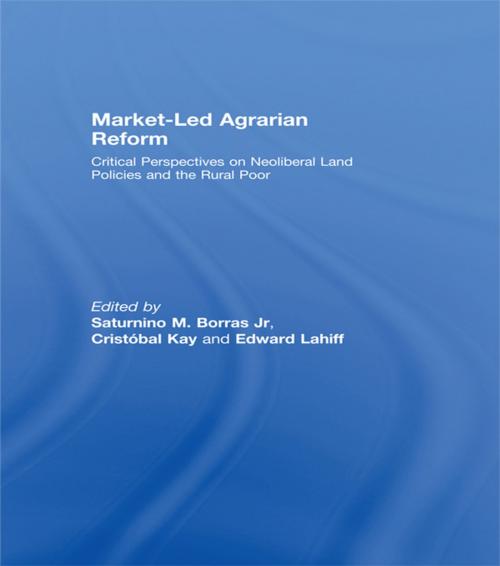Market-Led Agrarian Reform
Business & Finance, Economics, Economic Development, Nonfiction, Social & Cultural Studies, Political Science| Author: | ISBN: | 9781317990956 | |
| Publisher: | Taylor and Francis | Publication: | September 13, 2013 |
| Imprint: | Routledge | Language: | English |
| Author: | |
| ISBN: | 9781317990956 |
| Publisher: | Taylor and Francis |
| Publication: | September 13, 2013 |
| Imprint: | Routledge |
| Language: | English |
Three-fourths of the world’s poor are rural poor. Most of the rural poor remain dependent on land-based livelihoods for their incomes and reproduction despite significant livelihood diversification in recent years. Land issue remains critical to any development discourse today. Market-led agrarian reform (MLAR) has gained prominence since the early 1990s as an alternative to state-led land reforms. This neoliberal policy is based on the inversion of what its proponents see as the features of earlier approaches, and calls for redistribution via privatized, decentralized transactions between ‘willing sellers’ and ‘willing buyers’. Its proponents, especially those associated with the World Bank, have claimed success where the policy has been implemented, but such claims have been contested by independent scholars as well as by peasant movements who are struggling to gain access to land.
This book presents three thematic papers and six country studies. The thematic papers address issues of formalisation of property rights, gendered land rights, and neoliberal enclosure. These studies demonstrate the pervasive influence of neoliberal ideas on property rights and rural development debates, well beyond the ‘core’ question of land redistribution. The country cases bring together experiences from Brazil, Guatemala, El Salvador, Philippines, South Africa and Egypt. Common findings include the success of landowners in minimising the impact of reform, and a lack of post-transfer support, translating into marginal impact on poverty.
The limitations of the market-led approach, and the implications of the studies presented here for the future of agrarian reform, are considered in the editors’ introduction.
This book was a special issue of The Third World Quarterly.
Three-fourths of the world’s poor are rural poor. Most of the rural poor remain dependent on land-based livelihoods for their incomes and reproduction despite significant livelihood diversification in recent years. Land issue remains critical to any development discourse today. Market-led agrarian reform (MLAR) has gained prominence since the early 1990s as an alternative to state-led land reforms. This neoliberal policy is based on the inversion of what its proponents see as the features of earlier approaches, and calls for redistribution via privatized, decentralized transactions between ‘willing sellers’ and ‘willing buyers’. Its proponents, especially those associated with the World Bank, have claimed success where the policy has been implemented, but such claims have been contested by independent scholars as well as by peasant movements who are struggling to gain access to land.
This book presents three thematic papers and six country studies. The thematic papers address issues of formalisation of property rights, gendered land rights, and neoliberal enclosure. These studies demonstrate the pervasive influence of neoliberal ideas on property rights and rural development debates, well beyond the ‘core’ question of land redistribution. The country cases bring together experiences from Brazil, Guatemala, El Salvador, Philippines, South Africa and Egypt. Common findings include the success of landowners in minimising the impact of reform, and a lack of post-transfer support, translating into marginal impact on poverty.
The limitations of the market-led approach, and the implications of the studies presented here for the future of agrarian reform, are considered in the editors’ introduction.
This book was a special issue of The Third World Quarterly.















